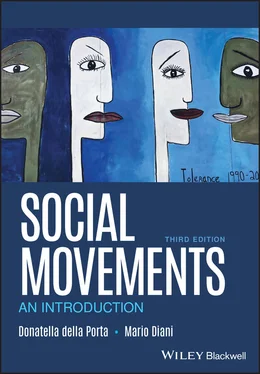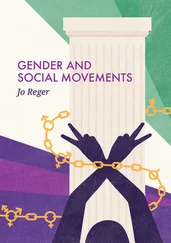The correspondence of nation‐state and society is nowadays weaker than it was in the past. In this sense, economic globalization has called into question not only the role of the nation‐state, less and less capable of governing within its own borders, but also, in more general terms, the capacity of politics to intervene in the economy and regulate social conflict. Global capitalism has in fact breached the longstanding historical alliance among capitalism, the welfare state, and democracy (Crouch 2004). The shift from Keynesian‐driven economics – with the state playing an important role in governing the market – to neoliberal capitalism implied a reduction of labor protection as well as workers’ rights (Brecher, Costello, and Smith 2000). Even left‐wing governments have espoused the liberal concepts of flexibilization of the workforce and cuts in social spending.
Overall, the capacity of the state to regulate behavior within a certain territory has clearly lessened. First, the importance of territorial political structures within single states has grown. In most cases this has been intertwined with the consolidation of various forms of territorial decentralization (della Porta, Keating et al. 2018). In some cases, moves toward autonomy have led to the emergence of genuine subnational entities, often in places where historical traditions of autonomy were strong, but even where they were weak. At the same time, the growing interdependence among states and the strengthening of some IGOs have weakened the idea of the states as the only relevant units in the international system. The devolution of regulatory power to IGOs such as the EU has unsettled national boundaries.
Globalization is not only a matter of new technologies but also of the political tools set in place to regulate and reproduce the mode of production through the proliferation of international governmental and nongovernmental organizations (Boli and Thomas 1999). While the national political context still filters the impact of international shifts on national politics, growing economic interdependence went hand in hand with “a significant internationalization of public authority associated with a corresponding globalization of political activity” (Held and McGrew 2000, p. 27). From this perspective, the international system based on the nation‐state seems to be mutating into a political system composed of overlapping multilevel authorities with low functional differentiation and scant democratic legitimacy. In the political system, globalization has brought a transnationalization of political relationships. In fact, research into international relations has highlighted a pluralization of relevant actors (Nicholson 1998, p. 131 ff.). Since the Second World War, there has been a growth in the number of international governmental organizations with both a worldwide scope of action (like the United Nations) and a regional one (like the European Union, but also Mercosur in Latin America and NAFTA in North America); with military objectives (NATO or the now defunct Warsaw Pact) or with the declared aim of fostering economic development (the IMF, World Bank, or WTO) (Princen and Finger 1994, p. 1).
International organizations have contributed to the spread of international regulations and norms, which in some cases supersede national sovereignty. As has often been pointed out, “no official authority controls states in the contemporary world system, but many are subject to powerful unofficial forces, pressures and influences that penetrate the supposed hard shell of the state” (Russett and Starr 1996, p. 62). Furthermore, while the majority of intergovernmental organizations function as a meeting place and discussion forum where decisions are taken unanimously and then ratified by national organs, a growing number of international organizations make decisions on a majority basis that bind all member states (Russett and Starr 1996). International governmental organizations have been both tools for economic globalization, through policies liberalizing trade and the movement of capital, and a way to govern processes that can no longer be handled at the national level.
This does not mean that the state has lost its centrality, but undoubtedly the presence of simultaneous moves toward the constitution of supranational and subnational authorities has brought about significant changes in the construction of collective actors. For example, in the case of minority nationalities within multicultural states, the presence of supranational entities tends to change the criteria according to which actors define themselves, as well as their strategies. European integration has certainly contributed to the remobilization of ethnic minorities in western European states, providing them with a new interlocutor and new goals: from the construction of new states following the breakup of those already in existence, there has been, increasingly, a move toward the renegotiation of relationships between central and peripheral regions of a state, within a “regional Europe.” At the same time, we have seen a shift from nationalist identities with a strong ethnic component, to identities that combine reference to the nation with greater attention to multiculturalism and the cohabitation of diverse cultural groups (Johnston 1991; Melucci 1996). The struggle for self‐government of indigenous peoples addresses not only specific rights, but also the very political rights of nonterritorially bounded communities (Brysk 2000; Yashar 1996).
Moreover, not only has globalization weakened the power of politics over economics, it has generated transnational conflicts on the policies of international institutions, producing different results depending on the organization and field of intervention involved. In particular, opposition has arisen to the neoliberal policies of the so‐called international financial institutions (such as the IMF or the WB), which wield strong coercive power through the threat of economic sanctions and conditionalities on international credit.
More generally, in addition to the acquisition of power by these largely nonrepresentative, nontransparent bodies, criticism has centered on their manifest democratic deficit. Similar considerations may hold for other international organs, for example, in the sphere of the United Nations, or for other types of policy enacted by the European Union itself, from environmental issues to human rights. In all of these cases, new opportunities have emerged for mobilization and campaigns conducted on a transnational scale (Marks and McAdam 1998). As governance began to involve multiple territorial levels, protestors also started to develop multilevel strategies (Imig and Tarrow 2001a and 2001b; della Porta and Tarrow 2005; della Porta 2004a; della Porta and Caiani 2006; see also Chapter 8).
2.2.2 State and Classes: The Conflicts around the Welfare State
The state does not influence the formation of collective actors only through the definition of territorial boundaries to political action. It is well known that the role of the state in the economy has increased progressively in the course of the twentieth century, peaking in the 1970s, and then, even if unequally in crossnational comparison, declining with social expenditures at the turn of the century (Crouch 1999). However considered, since the 1950s, even in many developing countries, the state moved for a while from being a guarantor of the market to managing economic activities through public enterprise; moreover, the welfare state has contained social inequalities (for a global discussion, see Rose 1984). This has led some observers to hold that the principal social cleavage was no longer based on the control of the means of production, but relates, rather, to the procurement of the means of survival either in the private market or through public intervention (Crompton 1993, pp. 103–104). Certainly, criteria for allocation of public resources, often those concerned with the satisfaction of basic needs such as housing or transport, have represented a significant area for collective action, in particular, for social groups from an urban context (Castells 1983; Pickvance 1985, 1986).
Читать дальше












